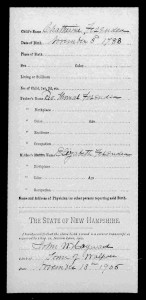 I was recently asked about the apparent disappearance of the eighteenth- and nineteenth-century vital records of Walpole, New Hampshire. The originals survived into the early twentieth century, but they are no longer to be found in the town clerk’s office in Walpole.
I was recently asked about the apparent disappearance of the eighteenth- and nineteenth-century vital records of Walpole, New Hampshire. The originals survived into the early twentieth century, but they are no longer to be found in the town clerk’s office in Walpole.
I did some digging. In New Hampshire, vital records for each town are located at the town level. Therefore, the original vital records books for Walpole should be housed with the town clerk. However, when I called the town clerk, she stated that the records currently in the town’s collection start in the 1850s. According to the clerk, the early town records were burned in a fire. She did, however, suggest that I call the Division of Vital Records Administration, New Hampshire Department of State, in Concord to learn more about the practices of preserving vital records in early New Hampshire.
According to the Division of Vital Statistics, the state of New Hampshire began implementing statewide registration of births, marriages, and deaths in 1848, but did not see compliance by every town/city. Moreover, when these vital records were sent to the New Hampshire Secretary of State, the collection was misplaced. Later, in 1888, the State of New Hampshire began publishing vital records, and included births/marriages/deaths at the end of each town report. However, this practice was not followed by larger cities and towns due owing to the scale of the records they oversaw.
Finally, between 1903 and 1906, the State of New Hampshire began collecting vital records from cities and towns in an effort to create a central repository for these public records. The State compensated town clerks for each index card sent; this collection is now housed at the Division of Vital Records Administration. I should add that 14 New Hampshire towns did not participate.
Reverting to the case of Walpole, it is certainly possible that the eighteenth-century records were lost in a fire after the 1903–6 statewide collection was created. If so, this would explain their disappearance from the Walpole’s town hall.
Share this:

About Lindsay Fulton
Lindsay Fulton is a nationally recognized professional genealogist and lecturer who joined American Ancestors in 2012. She leads the Research and Library Services team as Chief Research Officer, as well as the research team working on 10 Million Names. In addition to helping constituents with their research, Lindsay has authored a Portable Genealogists on the topics of Applying to Lineage Societies and the United States Federal Census (1790-1950), and is a frequent contributor to the American Ancestors blog, Vita-Brevis. She was featured in the Emmy-Winning Program: Finding your Roots: The Seedlings, a web series inspired by the PBS series “Finding Your Roots with Henry Louis Gates, Jr.", as well as another popular PBS series, “Samantha Brown’s Places to Love.” Before, American Ancestors, Lindsay worked at the National Archives and Records Administration in Waltham, Massachusetts, where she designed and implemented an original curriculum program exploring the Chinese Exclusion Era for elementary school students. She holds a B.A. from Merrimack College and M.A. from the University of Massachusetts-Boston. Area of Expertise: State and Federal Censuses, New England, Ireland, and New York research, with a focus on research methodology and organization. Lindsay also oversees the research team working on the 10 Million Names project.View all posts by Lindsay Fulton →